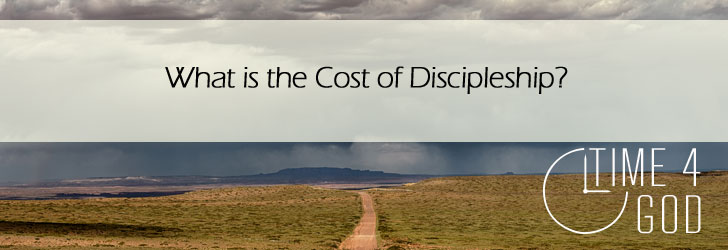What Is the Cost of Discipleship?
As Christians, we are all called to be God’s disciples in the world today. What does that mean?

As Christians, we are all called to be God’s disciples in the world today. What does that mean? Are there examples of discipleship that we can look at in the context of our own times?
We know what discipleship looked like in the New Testament times. We have great examples in the Apostles, in Martha and Mary, in Mary Magdalene, and in the likes of St. Stephen, who is stoned to death for his faith, in the presence of the one named Saul, who would later become the great one, Paul. We see clearly how each of these disciples knew and loved Jesus, how they came to that faith through their own frail humanity and how they could willingly set aside their own desires, even their own fears to be true to the teachings of Jesus and to themselves, because of their relationship with Jesus. They are our spiritual heroes. We look to them for guidance and try to model our own lives in like manner.
This is not easy for us to do because their times and their lives were so different from our own. Our own times seem to us to be more complicated in many ways. But more than that, it is one thing to look at their lives at such a great distance, but it is another thing altogether to try to translate those models of discipleship into our own here and now. It is when we try to translate the actions and beliefs of discipleship that we have seen in the scriptures into our own times that we run into the painful, intimate realization of reality in the present moment. It is no longer an idea that we are able to think about and pray over. Now it becomes a matter of turning idea into real action here and now. With real actions there are real consequences. Thinking, and even praying about discipleship, is not the same as actually living it and experiencing the consequences in the immediate moment. Sometimes it helps to have examples closer to us.
[content-ad]
The great Lutheran theologian, Dietrich Bonhoeffer, might be one to look at for our purposes here. He understood early on that Nazism was an evil that was being promoted as a good to the German people. He was given an opportunity to get out of Germany and took it. But it was not long afterwards that he began to be troubled by his decision. He began to realize that after the war was over, he would not be as effective in helping to rebuild the shambles of that society if he had not been there to share in the suffering with his people. He returned to Germany and became involved in an effort to overthrow Hitler. The effort was discovered and he and many others were arrested. He spent a couple of years in jail and was finally hanged on April 9th of 1945, just before the end of the war. He died a modern martyr for the faith.
Dietrich Bonhoeffer understood the cost of discipleship and he willingly paid it. He knew that it had to be something more than a mere statement of faith, mere words. He knew that it had to be a lived reality, and because of that, it would have its costs. He knew what Hitler and the Nazi philosophy was doing to the good people of Germany and others, and he knew what Jesus and the gospel required of him. He translated the idea of holiness and discipleship into the context of his own day. He knew that to be a disciple meant not withdrawal from the world, but engagement with it, in all of its duties, its successes, and its failures.
This is what Jesus is asking of us too. Our lives, thankfully, might not be entangled with the kind of dangers that Bonhoeffer knew, but there are real ‘dangers’ for us too. Sometimes being a true disciples of Jesus in our daily lives can cause us to risk the loss of a friendship, or a job. Standing up for what is true, good, and beautiful in a world that defines those things through the narrow prism of the individual ego, a world that no longer recognizes, or understands concepts like the ʺcommon good,ʺ can be dangerous indeed.
But, like the disciples of the New Testament, and like Dietrich Bonhoeffer, we too believe that Jesus is the Word through which all life, all that is true, good, and beautiful came to be, and that that Word, became flesh and dwelt among us, suffered with us, and died for us, so that we might live—forever. It is in this knowledge that we too can find the courage, through God’s grace, to be his disciples in our own time, in our own places, here and now. Thanks be to God.
SKM: below-content placeholderWhizzco for FHB

